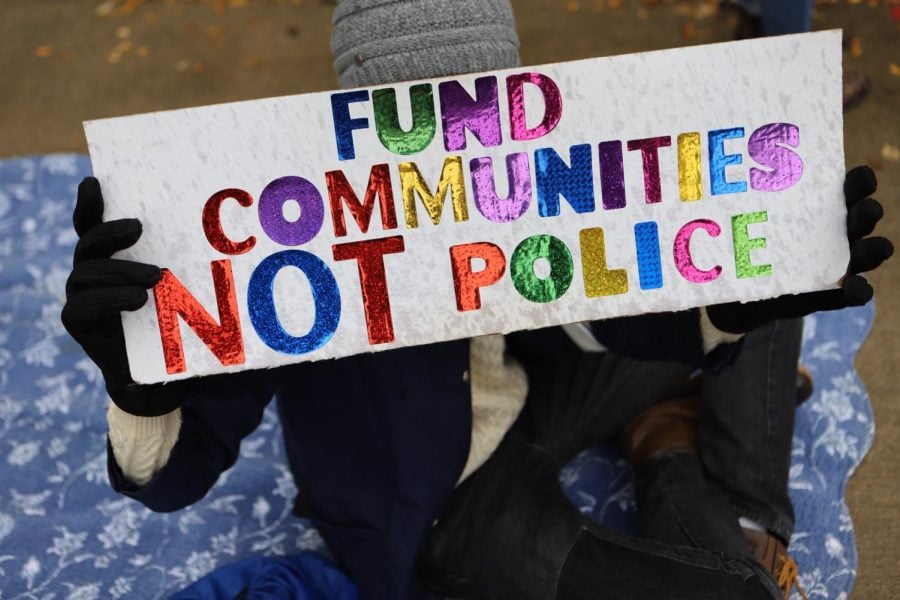NUCNC and FMO talk transformative justice ahead of Angela Davis address
Daily file photo by Evan Robinson-Johnson
A sign from a previous NU Community Not Cops demonstration, reading “Fund Communities Not Police.” Students reimagined justice in a Wednesday discussion led by FMO and NUCNC.
November 11, 2020
Students reimagined justice in a world without policing and prisons Wednesday evening during a discussion led by student organizers.
The teach-in on transformative justice was the fourth installment in the educational series co-hosted by For Members Only and Northwestern Community Not Cops. About 70 students dug into questions like “Who is justice for?” in the final teach-in of the week, which came one day before FMO’s State of the Black Union, where activist and academic Angela Davis will speak.
“Transformative justice is an abolitionist framework that understands institutions like the police and the prison-industrial complex that we have previously covered are inherently violent in order to maintain social control,” one organizer said. “These current systems position themselves as protectors while replicating the very harm that they say they are protecting us from.”
But this form of justice is not simply the absence of state and institutional violence, they added. Instead, they said, it depends on our ability to transform our relationships and move away from feelings of shame, blame, isolation and revenge.
There are two main barriers to this necessary transformation, one organizer explained. The first, discomfort, consists of non-confrontational impulses and the desire to banish negative feelings quickly. Abolition, they said, “necessitates confrontation.”
The second barrier is existing structures like education. All of our behaviors are learned, an organizer said — if we have learned violent, non-transformative notions of justice, then we can also unlearn them.
“It’s about asking, ‘Why do these terrible things happen?’ rather than just reacting after the fact, as we do,” they said.
An economic structure that values property over people is another barrier, as is a lack of imagination. Abolition is about “being able to see and create a world that is different” from our current one, they said.
After organizers gave an overview of the topic, students entered breakout rooms, where they discussed what transformative justice looks like for both the person harmed and the one causing harm.
One student said transformative justice involves making sure the person harmed is not doing all the work to rehabilitate the person causing harm. Another student questioned society’s conflation of justice and violence.
One of the organizers also questioned why solutions like “arrest killer cops” is considered justice. They questioned how arresting cops prevents police brutality from happening again — and how it restores what was taken from family members who have had a loved one killed by police.
“Have we ever really, truly thought about what harm is caused or have we always assumed what the harm was and how to solve it?” they said.
When considering those questions, the organizers said they think of mothers who have lost sons to gun violence, who report feelings of loneliness and a sense of loss for their child’s possibility. They prodded attendees to consider how we can offer restoration to those feelings and question how incarceration answers such harm.
It is that question of “why” that is at the core of their understanding of abolition.
“Why did this happen and what did it cause? And really making sure we’re critical about examining that and making sure we actually know the answers,” they said.
Email: [email protected]
Twitter: @pamesjollard
Related stories:
– NUCNC explains differences between police reform and abolition
– NUCNC and FMO co-host teach-in on policing alternatives
– NUCNC and FMO host teach-in on the history of prison abolition


